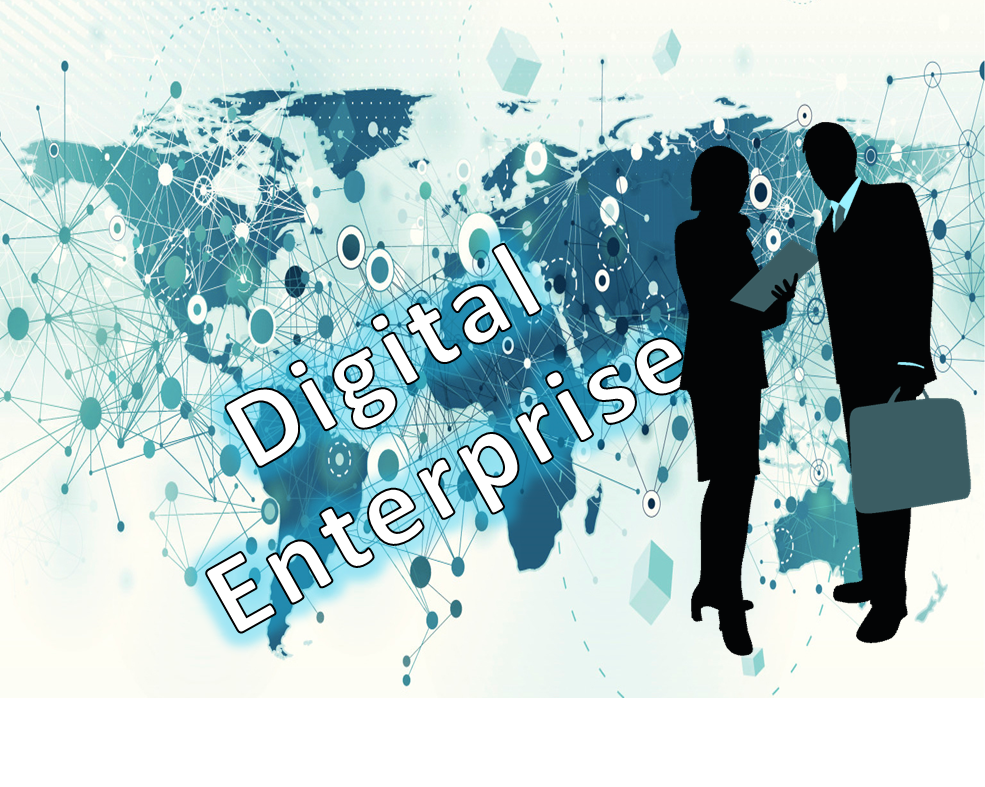“How might the strategies [of today’s struggling retailers] have changed,” asks David Pate, managing director of business development at TBM Consulting Group, “if they had started looking at and responding to the right indicators much earlier?”[1] He adds, “The ability to see your data from different perspectives is invaluable under any circumstances, but especially in the face of rapid marketplace evolution.” Eugene Berger, Chief Technologist for Hewlett Packard Enterprise Aruba, UK & Ireland, insists it’s time for companies to transform themselves into a digital enterprise. “It’s 2017,” he writes. “Going ‘digital’ is no longer a choice, but an integral part of any business strategy worth its salt.”[2]
Big Data and the Digital Enterprise
The Digital Age emerged from the Computer Age when massive amounts of data began to be generated. Beverley Head (@BeverleyHead) insists, “The digital disruption rippling through business and government today is merely a curtain raiser for what comes next.”[3] Barkha Jasani (@barkha_jasani), Head of Research & Development at DataStreamX, insists the “upsurge in data volumes … comes with the insatiable need by industry-leading companies to exploit existing data to foster business development and growth.”[4] Data has become such a valuable commodity the World Economic Forum now classifies it as resource as valuable as oil. Jasani goes a step further and insists data is now the basis of a “data economy.” She writes, “We can see the data economy expanding as the many barriers that hinder and impede its progress are torn down.” Even though data is valuable, too much data, like too much oil, can be a problem. Jasani explains, “Most users cannot consume all the data they have access to nor should they be given more than what they need. In this regard, industry leading companies will be using data to build a basic product that addresses a specific customer need. End users should be provided with usable data products that can solve their problem and not what the product creators want them to have.”
Fortunately, new technologies, like cognitive computing, are maturing rapidly and can help deal with the oceans of data being generated. Professor Mary-Anne Williams, director of the innovation and enterprise research lab at the University of Technology, Sydney, insists cognitive computing is already a game-changer. “Cognitive computing,” she told Head, “is able to convert vast volumes of complex data into decision-making models that can be used take action autonomously without human oversight or intervention. We have seen these kinds of robust decisioning systems dominating the stock market for some time and increasingly they are being deployed in a much wider range of applications from chatbots offering customer service to medical diagnosis and treatment recommendations, autonomous lane changing in cars, and social robots working with children and the elderly.” Although autonomous decision making has a role, I believe cognitive computing will have its greatest impact augmenting human decision-making. Bain analysts, Michael C. Mankins and Lori Sherer (@lorisherer) insist decision-making is one of the most important aspects of any business. “The best way to understand any company’s operations,” they write, “is to view them as a series of decisions.”[5] If all of those decisions are made, aided, and/or informed by cognitive computing platforms, the advantage should be obvious.
Putting Data to Work in the Digital Enterprise
Jasani suggests there are three pillars of the digital economy enterprises should embrace. They are:
- Data supporting business strategies. “Industry leading companies often change their business strategies to adapt to environmental changes. This means … various teams in the company can be tasked to focus on different customers and products over time. This leads to changes and inconsistencies in the data that the company receives as input or that it generates internally. In this regard, the strategy team will increasingly need to promptly communicate the company’s long-term vision to the data team to ensure that the volume, velocity, veracity, and variety of the data in its products are aligned with the company’s vision.”
- Quality data leading to long-term profitability. “One of the biggest challenges of working with data is transforming it into a usable form. Overlooking the data engineering process of cleaning the data and trying to build the product right away will only lead to failure. Data economy leaders ensure that they use high-quality data in building their products.”
- Automation ensuring scalability and profitability. “Companies are short on data science resources. As such, the manual and daily extraction of data products become unprofitable. To succeed, industry leading companies are able to continue generating revenue with minimal effort. They automate the data packaging and ETL (Extract, Transform, Load) processes and deliver data products to users on a regular basis without the need for human intervention. This allows them to easily scale from 1 to however many clients they want.”
Cognitive computing platforms can help ensure all of those pillars are in place. By gathering, integrating, and analyzing structured and unstructured data, cognitive computing platforms ensure users get the right data at the right time in the right format. Because cognitive computing platforms utilize natural language processing, users don’t need to be computer experts or math whizzes to get value from company data. Since the data is integrated, it avoids information silos that often challenge corporate alignment and digital strategies.
Summary
Jasani concludes, “Companies at the top of the data economy are those that focus on the use cases of their data products.” The editors at Enterprise Innovation predict, “Artificial intelligence technologies will be the most disruptive class of technologies over the next 10 years. … Emerging technologies require revolutionizing the enabling foundations that provide the volume of data needed, advanced compute power, and ubiquity-enabling ecosystems. The shift from compartmentalized technical infrastructure to ecosystem-enabling platforms is laying the foundations for entirely new business models that are forming the bridge between humans and technology.”[6] Pate adds, “The insights and benefits from your data build on themselves as you get new perspectives on opportunities and threats and establish or modify strategic plans.” Most analysts see a clear competitive advantage for the digital enterprise. The best platform upon which to build a digital enterprise is a cognitive computing platform.
Footnotes
[1] David Pate, “The Urgency of Better Strategic Insights: Why It’s Time To Act,” IndustryWeek, 27 July 2017.
[2] Eugene Berger, “Take Control of Large Public Venues Through Mobile Engagement,” HPE Newsroom, 11 July 2017.
[3] Beverley Head, “The future will be fuelled by data,” Information Age, 22 August 2017.
[4] Barkha Jasani, “3 Pillars of the Data Economy,” Datafloq, 21 August 2017.
[5] Michael C. Mankins and Lori Sherer, “Creating value through advanced analytics,” Bain Brief, 11 February 2015.
[6] Editors, “3 megatrends for digital business into the next decade,” Enterprise Innovation, 16 August 2017.





